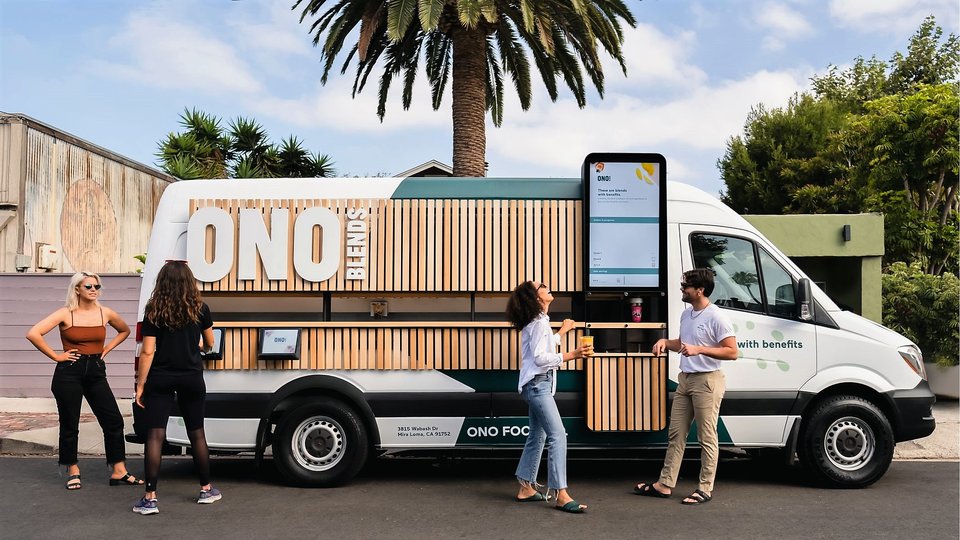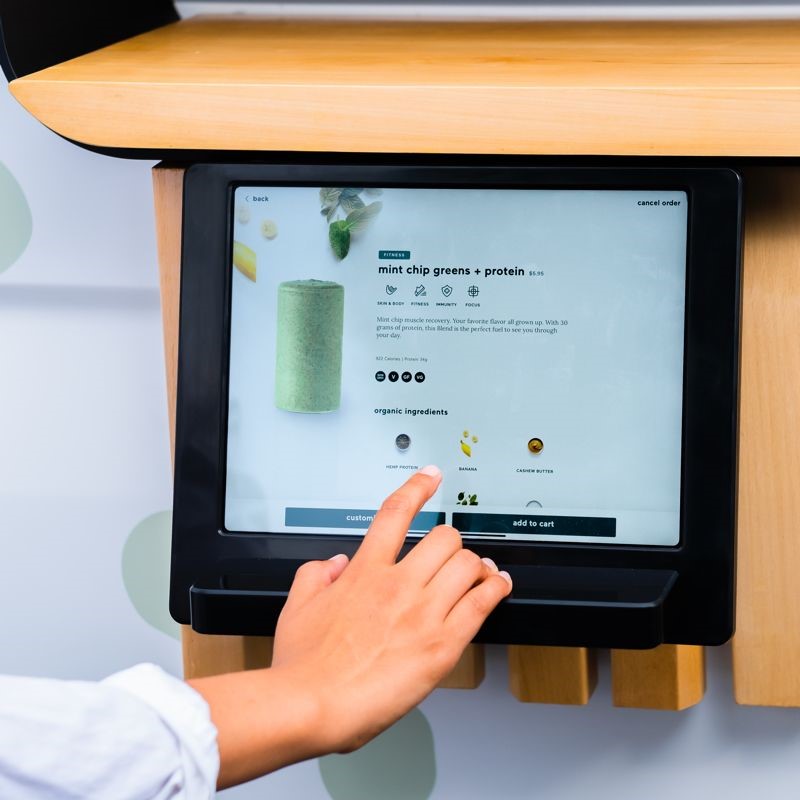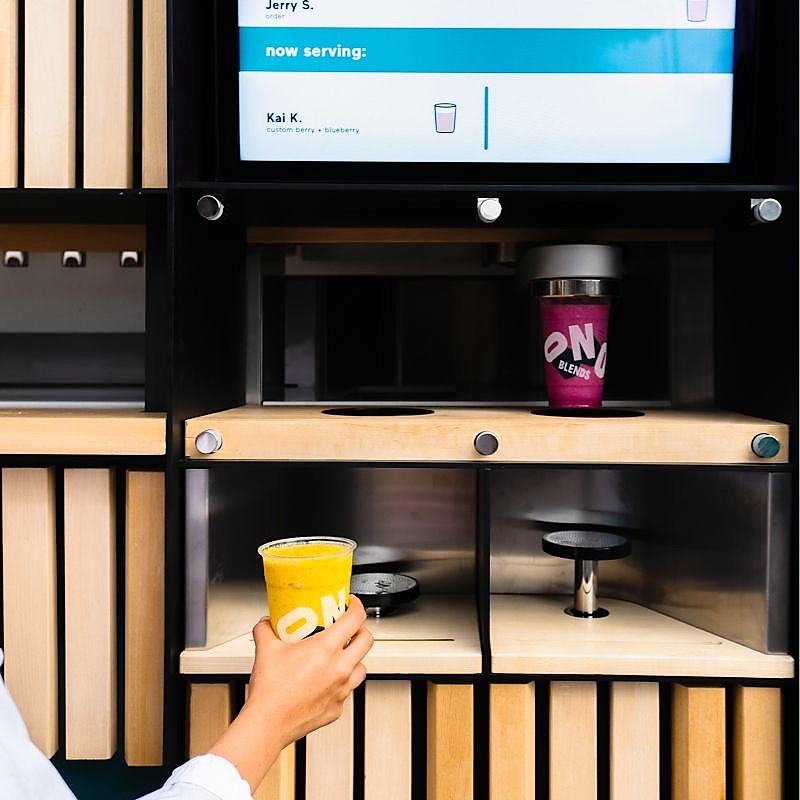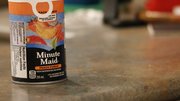Restaurants
Speed, quality and health: LA smoothie truck combines robotics with self-order kiosks
Ono Blends, a smoothie kitchen on wheels operated by Ono Food Co., offers tasty cold treats prepared and served automatically with state-of-the-art robotics.

June 17, 2020 by Elliot Maras — Editor, Kiosk Marketplace & Vending Times
What do you get when you combine three of the top trends in today's commercial foodservice industry — online ordering, health focused menus and food trucks?
Head to Los Angeles and you can order an all-natural smoothie from a fully automated mixer without having to speak to anyone. Ono Blends, a smoothie kitchen on wheels operated by Ono Food Co., offers tasty cold treats prepared and served automatically with state-of-the-art robotics. The self-service "smoothies on wheels" has been serving time-pressed, health conscious Angelenos since November.
 |
| A customer places an order using the touchscreen. |
Customers simply approach one of the two ordering kiosks on the side of the truck, browse the menu, order their selection on the touchscreen and watch as robotic systems create their blends from scratch. Within 60 seconds, blends are dispensed at the pick-up area.
Customers can even place their order on their smartphone in advance. Once they are within a 300-foot radius of the truck, the robotic systems can create their order to ensure the blend is freshly prepared by the time they arrive.
A fully automated process
"The automation begins when the order is initiated," Derek Pietz, former head of automation at Sweetgreen, who joined Ono Foods as vice president of automation last month, told this website via email. "Humans fill up the hoppers with ingredients at the beginning of the day (strawberries, organic coconut water, chia seeds, etc.), but every aspect of the smoothie assembly is automated from dispensing ingredients to blending."
Hundreds of sensors monitor the assembly process to ensure there is no spillage, cross-contamination or inconsistencies. This enables Ono Blends to serve customers with dietary restrictions, allergies or specific product preferences. The kitchen is NSF 169 certified, the equivalent to best in class sanitation.
While the self-order kiosks do not suggest additions to customer orders, the menu presents a large variety of options that allow multiple ingredient combinations.
The kiosks communicate directly to the blenders; there is no kitchen display screen since there are no humans involved in preparing the orders. Orders are normally prepared in 20 to 30 seconds, and delivered in under a minute.
Once the order is completed and dispensed in the cup, a robotic arm beneath the dispenser extends the cup to the customer.
"The customer can then choose if they'd like to apply one of our compostable lids or compostable straw," Pietz said.
 |
| Derek Pietz joined Ono Food Co. from Sweetgreen. |
Customers can pay at the kiosks with credit cards, debit cards, Apple Pay, Android Pay and Google Pay. They can also pay the attendants, known as "guides," with cash.
While the production process is fully automated, guides are on hand to help customers if needed. There are usually one or two guides working on the truck at a time.
"Their role is to educate customers about how the technology works, explain where our high-quality ingredients are sourced, and provide information about where to find us next," Pietz said. "They are responsible for maintaining our industry leading NPS (Net Promoter Score) score of 95."
Ono Blends can provide 60 people with blends per hour compared to the industry standard of just 20 per hour.
Convenience and health are not the only consumer hot button issues Ono Blends advances.
Environmentally sustainable
The robotic kitchen runs on batteries instead of a diesel generator. Where smoothie restaurants typically use gallons of water to clean each blender, Ono's patent-pending automated self-cleaning blender and robotic systems use 28 times less water because it only needs to clean the blade and because it's blended in the customer's compostable cup, Pietz said. From cups to straws, all of Ono's consumables are compostable.
 |
| Customers can see the status of their order at the pick up area. |
"Everything is vertically integrated — from the software that powers the ordering kiosks to the automation that powers the food production to food we produce with our culinary team," Pietz said. "Most companies outsource, but we believe being vertically integrated is the best way to build a company that customers love, and this has been backed up with customer reviews."
"Combining our backgrounds in tech, automation and culinary fine dining, we knew we could fill this void to give more people access to healthy, high-quality food," said Stephen Klein, co-founder and CEO. "Fast food options usually fall into two buckets: fast, healthy and unaffordable — or fast, unhealthy and affordable — and nothing in between."
Where Pietz cut his teeth in foodservice automation at Sweetgreen, a fast casual chain specializing in salads, Klein gained insight in his previous role as vice president of operations at CafeX Technologies, a self-service, robotic coffee bar.
The company did not wish to reveal financial information.
Pictures courtesy of Ono Food Co.
About Elliot Maras
Elliot Maras is the editor of Kiosk Marketplace and Vending Times. He brings three decades covering unattended retail and commercial foodservice.
 ChatGPT
ChatGPT Grok
Grok Perplexity
Perplexity Claude
Claude









